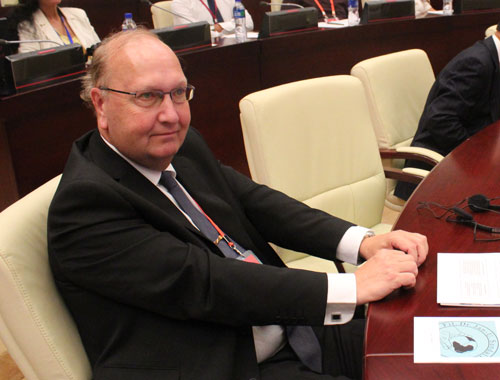
outline of the speech (For more speech info,please feel free to contact us):
Culture exchange and cooperation of cities along the Silk Road í¬ religion, culture and education
Silk Road facts
Silk Road history goes more than 2500 years back in time.
Trade of gold, silver, ivory, gems, glass, food, lacquer ware, porcelain, jade, bronze and silk.
Major impact in cultural, political, military, economic, religious, and artistic exchanges.
People and functions along Silk Road
Military and political leaders, fearless explorers, religious pilgrims, great thinkers, humble tradesmen, religious figures, learned scholars, scientists, explorers, intellectuals (to mention a few cathegories)
Historic names like Alexander the Great, Confucius, Marco Polo, and Timur.
A new approach
In our time development is carried out by special people, their activities and functions:
Social innovation, social entrepreneurs,and social entrepreneurship.
Culture exchange and cooperation of cities along the Silk Road based on social entrepreneurship:
Social entrepreneurship
Social entrepreneurship is a special form of management whose purpose is to run a production function in such a way as to ensure increased value for all the participating parties in that function. The main objective of social entrepreneurship is to make the world a better place for everyone. The process of social entrepreneurship leads the society in a democratic direction (Sandal, 2004).
The process of change is carried out by the individual person who is designated a social entrepreneur; a person specialized in starting and running a business in the social sector of the economy an individual person responsible for the activity and the debt and controls the production means.
Social innovation
Social innovation denotes the process whereby the individual makes free and independent decisions concerning the combination and use of factors of production, with the aim of introducing a social service which improves peopleí»s lives and has not been on the market previously (Sandal 2004). Innovation implies that one is able to do something which previously could not be done, or at least not so efficiently or economically.
Innovative mechanism of social changes
Individuals in the population take on different roles in social structure and in the political system. Entrepreneurship is a highly specialized activity taking place in the second and third sectors where entrepreneurs fill the typical features of entrepreneurship. There are no innovations in the first sector whatsoever as the public administration is governed by strict rules and its mission is to keep control and exercise power. Individuals have a clear channel directly to the national assembly through fulfillment of innovations.
Increase of quality of life
Every sector in the social system is object to change:-education, elderly care, kindergartens, sports, music and arts, environment, health care, employees, unemployment, alcohol and drug addiction, transportation, immigration and refugees, human rights and the peace process, economic and political development, etc.
Initiatives
Open up the markets for social entrepreneurship along the cities of Silk Road,
More independent, international science,
Distribution of scientific independent research,
Education on social entrepreneurship towards culture, trade and industry, religion and individuals, especially on the significance of innovation as a driving force for democratic development as a base of cooperation.
Fil. Dr. Jan-U. Sandal Institute
Dr. Jan-Urban Sandal is the founder, owner, Executive Director and President of his privately owned institute; Fil. Dr. Jan-U. Sandal Institute where he conducts independent and international scientific research and teaches courses based on innovative pedagogy. Fil. Dr. Jan-Urban Sandal Institute offers more than 35 courses in the fields of innovation, business entrepreneurship and social entrepreneurship, economic history, humanistic disciplines and the practice of a wide range of different administrative subjects at all levels.
Dr. Jan-Urban Sandal is scientific adviser to the Royal Norwegian Ministry of Trade and Industry on issues concerning Social Entrepreneurship and Nordic Council board discussant in issues on Social Entrepreneurship and has supervised official reports on topics concerning poverty and Social Entrepreneurship.
Fil. Dr. Jan-U. Sandal Instituteí»s international agreements include at the moment app. 60 000 students and 20 000 faculty members and staff and offer participants full access to activities sanctioned by the agreements regardless of race, colour, sex, religion, age, disability, marital status, sexual orientation, or national origin.










